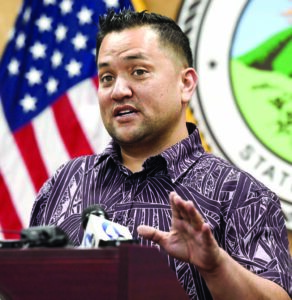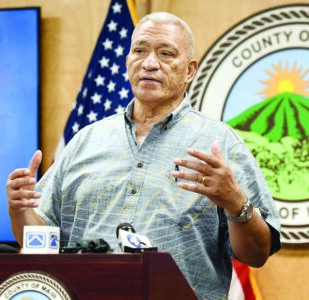Program to help cover costs for displaced families’ hosts
Hosts can apply for up to $1,500 a month
WAILUKU — With at least 190 families displaced by the Aug. 8 fires living with family and friends, government and nonprofit groups on Tuesday announced a $4 million pilot project to help cover expenses for host families.
“The idea here is to create or foster the aloha spirit and camaraderie that is already existing in our community,” Mayor Richard Bissen said at a news conference Tuesday morning. “I think the number one thing it does is keep people with family and friends, people they are familiar with in most cases. But this program can be used by anyone in our community.”
Even hosts across the state who are housing displaced Maui residents can apply, officials said. Those housing the displaced can receive $375 per month per person, with a cap of $1,500 a month, which is equivalent to housing a family of four.
“Most people come up and say ‘how can I help’ besides volunteering and donating. One way they can help is opening their homes to people who may need to move out of the hotels or want to move out of the hotels. So this is just one of those options we are offering,” Bissen said in his ninth floor conference room at the Kalana O Maui building in Wailuku.
“Again the idea is that these are homes that already exist, in other words inventory is already here, we don’t have to wait for something to be built, some place to open up. So we are going to encourage this host families project and we are excited about it and we think it will be one of the many solutions that we are going to offer,” Bissen said.
The county, American Red Cross and the Hawai’i Community Foundation announced Tuesday that the Council for Native Hawaiian Advancement will administer the “Host Housing Support Program,” whose application process launched at noon Tuesday.
Host families can apply online at www.HawaiianCouncil.org/HostFamily, in person at CNHA’s Kako’o Maui Resource Hub at Maui Mall in Kahului or by calling (808) 596-8155.
CNHA CEO Kuhio Lewis said at the news conference that over 25 percent of people they have spoken to at the resource center and at town hall meetings noted they are saying with family and friends.
“One goal this program is trying to achieve is providing immediate stability to those homes, so they can buy their added food, cover the added expenses to host those families,” Lewis said.
He hopes this program would also entice others to open their homes as well.
Lewis said there is no breakdown yet on the cost share between his organization along with the Red Cross and Hawai’i Community Foundation, but there is a commitment for $4 million, which he expects to last at least six months.
Acknowledging there are multigenerational families being housed, which may exceed the $1,500 cap a host could receive per month, Lewis said, “Right now we are still in a phase where we are going to learn a lot likely in the next 30 days and we will make adjustments.”
But he added that for now, $1,500 would be the cap.
Lewis explained after the news conference that they have already identified 190 displaced families living with family and friends, averaging 3.6 people per family, which is how they arrived at the $1,500 cap for four people.
Lewis said they are also exploring making the payments retroactive, knowing that some hosts have been housing displaced residents for two months now.
“We know that having guests and that being a guest isn’t always easy,” Sheila Sarhangi, HCF’s vice president of strategic communications, said at the news conference. “There are inconveniences and there are sacrifices that people need to make. But we all know that when a friend or a family rallies around us, it can make the hurt a little better and it can make the healing more of a reality. So this program is here to put resources into the pockets of households that have graciously put out the welcome mat for people to stay with them and the way we see it at HCF is Hawaii people helping Hawaii people.”
Amanda Ree, director of wildfire long-term recovery programs for the American Red Cross, said in a news release, “No one organization can possibly meet the multitude of needs created by the impact of such a destructive disaster. We are honored to work collaboratively with the County of Maui, CNHA, and HCF to support the people of Maui and embrace a community-led recovery.”
In order to participate in the program, host households must:
• Be a resident of Hawaii hosting a family/individuals affected by the Maui wildfires.
• Provide the address of family/individuals whose home was damaged by the Maui wildfires.
• Pass a housing quality standard inspection.
• Comply with monthly assessments of applicant qualifications.
• Have the impacted family or individual certify that they are living with the host.
Lewis said the housing inspection by someone from the program will ensure the host residence is a stable home, and that there is access to a bathroom and kitchen.
He said there will be some leniency but the goal is to provide stability for the families.
Dave Gutierrez of the American Red Cross, said at the news conference that there are currently 7,000 individuals that are in noncongregate shelter care. In the last couple of days they transitioned around 120 households out of shelters. In order for people to continue in the noncongregate shelter program, which provides accommodations in hotels and other similar lodging, they must have had major damage to their home and also have a FEMA registration number and a Red Cross case number.
Gutierrez, who is the National Incident Command Team senior director, said about 190 households currently do not meet criteria for the noncongregate sheltering services, but added that none of them has been asked to leave their shelter until they’ve spoken to the Red Cross. He expected that some of the 190 would qualify for further services but said he would have more details at the end of the week.
Gutierrez said they will try to find help from other organizations for those who may not meet the criteria for lodging.
* Staff Writer Melissa Tanji can be reached at mtanji@mauinews.com.
- Council for Native Hawaiian Advancement CEO Kuhio Lewis fields a question during a news conference Tuesday at the Kalana O Maui county building in Wailuku. CNHA will be administering a pilot program announced by the county on Tuesday to help compensate homeowners who host Maui residents displaced by the wildfires. The Maui News / MATTHEW THAYER photos
- Maui County Mayor Richard Bissen announces the launch of the Host Housing Support Program Tuesday morning in the Mayor’s Conference Room at the Kalana O Maui county building in Wailuku. The program will provide compensation up to $1,500 a month to homeowners who shelter Maui residents displaced by wildfires.






